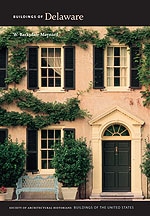
This brick building is the last of the thirty or so Wilmington taverns of the eighteenth century, which had colorful names (Bull Frog, Foul Anchor, Golden Swan, Weeping Willow). A certain John Marshall ran the Sign of the Ship in Revolutionary days, and American officers had headquarters there. After the war, it was O'Flynn's, and Washington's diaries show that he occupied the “best room” on the second floor whenever (as in 1787) he “lodged at Wil. at O'Flins.” Thomas Jefferson, John Adams, Aaron Burr, and others stayed here, too, and the proprietor feted the Marquis de Lafayette at Old Town Hall (WL19) in 1824. After 1835, it housed a clothing outlet, then a shoe store, but, as late as 1930, the owner preserved the front room where Washington supposedly slept. Little survives externally of its colonial appearance, except for its massing, a hint of a watertable, and the coves on the front facade and gable end.

